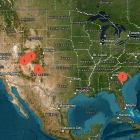
GEOL 500 StoryMap
Take a tour of the of the sites and locations the GEOL 500 class visits on their quest to map out the geological features of the Western United States.
Geological field techniques including the use of field instruments and the preparation
of geologic maps
6-Week Session I (3S1)
All graduates with a B.S. in Geological Sciences are expected to possess basic field skills in the geosciences. The GEOL 500 is a four-credit ‘capstone’ course that is taught every May and June in the high relief and arid American West, where such goals are most effectively achieved.
This course is taught by USC Geological Sciences faculty members and assisted by graduate student teaching and program assistants. Except in extenuating circumstances, enrollment is limited to 24 students, which provides an excellent student-to-teacher ratio. The course runs during the 3S1 summer session, typically departing Columbia in early-mid May and returning in mid-June.
Field work occurs in different locations in the American West, including the Colorado Plateau, the Rocky Mountains, the Basin and Range, and the Rio Grande Rift. Itineraries vary from year to year, but usually involve projects in Colorado, Utah, New Mexico, and Nevada.
Check out our StoryMap for a more in depth travel guide from past years.
GEOL 325 - Stratigraphy and Sedimentary Basins
GEOL 355 - Structural Geology and Tectonics
6-Week Session I (3S1)*
*Check with the Registrar’s Office for current Summer Semester Dates
There is an instructor override with this course. You cannot register for this course until you have completed the following:
Transportation is provided by the University in rental SUVs, which will be driven by certified staff and student drivers. A cargo truck driven by the program assistants carries group and personal gear.
Students should prepare for self-sufficient dispersed camping on public lands (BLM, USFS) and briefly in developed campgrounds. Students will sleep in personal tents. All meals are provided by the University, except during transit days when, for logistical reasons, students are responsible for their own (usually fast) food.
Camping equipment can be rented through the University's Campus Recreation.
Summer Course Prices:
USC Resident (or Non-resident) Tuition for 4 credit hours**
USC Technology Fee**
USC Lab Fee (Arts and Sciences Dept Fee)**
Program Fee – Marketplace - $1,500:
Students with demonstrated financial need should contact the SEOE Director.
**Check with the Bursar’s Office for current USC tuition and fees.